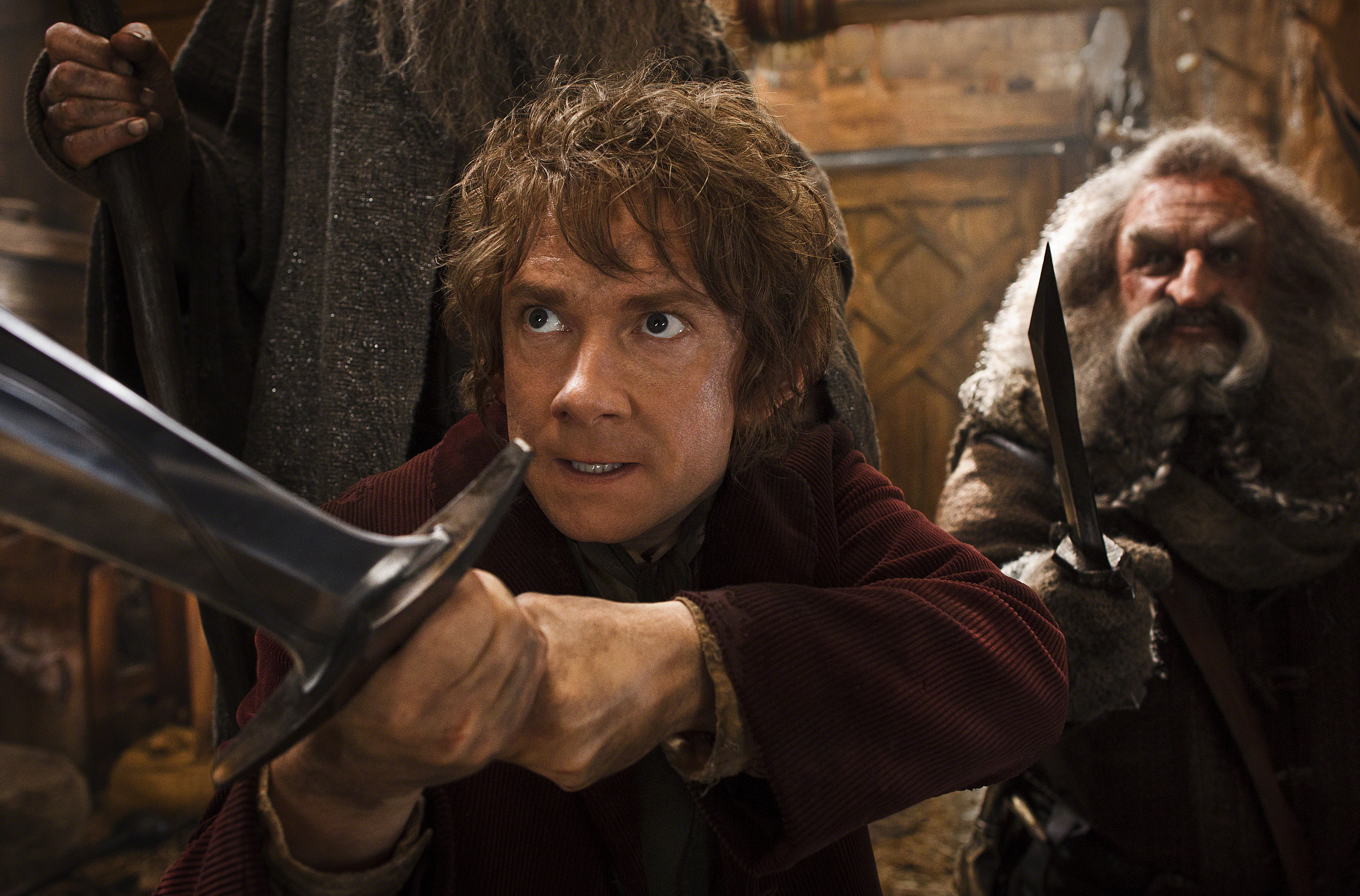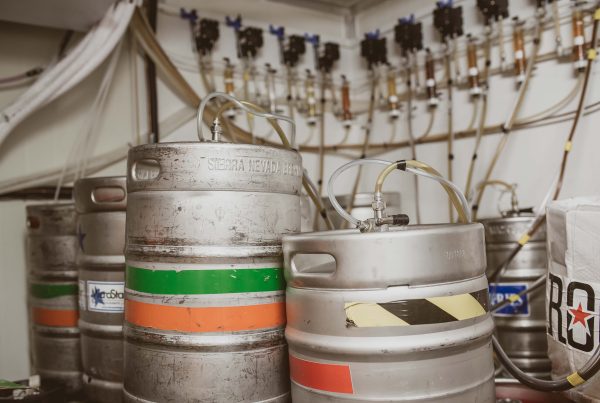
I think it was after the time where he turned the corner from being fairly mild and meek to finding a bit more of a backbone. I was always after that, really. I was always saying to Pete [Jackson], “Is it now? Surely this is the time where he’s a bit stronger.” And very often he’d say, “No, no, but it is coming, it is coming, not yet.” You spend so much time playing Bilbo as this reticent person who is just trying to find his voice and trying to find when to speak, just finding permission to breathe almost, that it is really good fun in this film when he does have to find that bit of steel inside himself. He really, really has to find that for his own safety and that of his friends.
Did you actively seek a wry humour when playing the more timorous Bilbo?
Ironically, my instinct now is not to bring humour to it, but either I can’t help it, or the writing dictates it. Also Bilbo is not a straight hero, of course. He is a flawed, funnyish, slightly ridiculous character. He is pompous and he is fairly small-minded. So it’s not like he can be James Bond.
And from Bilbo’s point of view, when he thinks he is being really serious, actually the world is going, “Prat!” Because he is puffing himself up in a classically English pompous way. It is funny. Pete was always asking me to do “that English thing”. I don’t really know what that is. It is like asking a Frenchman to be French, I suppose; we all know what national characteristics are. I am not aware of being especially British but I think maybe the rest of the world and, especially in the Commonwealth and English-speaking parts of the world, they might see something quite British or English in Bilbo.
How do you think Bilbo has changed by this stage in his journey with the Company of Dwarves?
In this film, he really, really has to change; it’s life and death. He comes across situations where, in Mirkwood with the Spiders, for instance, he has to do or die and save his friends. It is not a choice. He has to do it.
It is always good to play heroism out of necessity, which is what heroism is, I think, a playable, real thing that we can all relate to – something that you know is true or has a bit of reality to it. Most people don’t want to put themselves in life and death situations, but you will do it if you absolutely have to. It is a bit like that for Bilbo in this film.
What did you enjoy about finding Bilbo’s inner hero?
It’s just great playing the hero. It is a funny, self-fulfilling thing in some ways; people do not always see me as the classic, rugged hero, like Aragorn [the character played by Viggo Mortensen in The Lord of the Rings trilogy], for example, because they have never seen me as that before. Or maybe is it because of what I have done before that they don’t see me as that? Or is what I do out of necessity, because I know I am never going to get cast as someone like Aragon? Those sort of rugged heroes, they are just what we accept them to be.
Most of the people in the world weren’t vastly familiar with Viggo’s output before The Lord of the Rings films. He happens to be a brilliant actor and he is brilliant as Aragorn; he is brilliant in everything else I have seen him do. But, if that’s the world’s first contact with an actor, you go, “Oh, he is that”. How I became famous was from The Office, so that’s sort of what people associate me with. I am not putting myself in the same category as Al Pacino, but Al Pacino’s first big scene was Michael Corleone (in The Godfather) and that casts a long shadow, if that makes sense?
There were some terrific set pieces in the first film, from the Stone Giants to the Trolls. What can we look forward to in The Hobbit: The Desolation of Smaug?
The Spiders in Mirkwood are going to be great. I think it is a lovely bit. From my point of view, that is where Bilbo gets to find something else.
Is it quite a frightening sequence in Mirkwood?
I think it is. Spiders are just frightening. I still think that The Incredible Shrinking Man is a great film, especially the bit where he is fighting a spider with a needle and thread. It’s a film from the 1950s, so the effects are very rudimentary by our standards, but it is terrifying. There is just something about the way a spider moves. If a spider is big enough to dominate a human being with its big fangs, or even a Hobbit, then that is really horrifying.
And then there’s Smaug, of course…
Smaug will be very good, absolutely. Rather like the Gollum and Bilbo stuff in the book, which is lovely – and I think they adapted it brilliantly for the first film – Smaug and Bilbo is pretty iconic stuff as well. It is that battle of wits, though it is less about the wit for Bilbo and more about trying to stay alive. He’s not feeling very witty, but he does what he needs to do, at great expense. Those scenes are really good.
Mirkwood is excellent, too. We all start to freak out with this drug or this spell that is put over Mirkwood. Then, also, there is Beorn, the skin-changer played by Mikael Persbrandt. In a way, now that I am thinking about it, you can almost see the first film as an introduction, albeit a fantastic and exciting one. It leads up to what is to come, with Bard and the barrels sequence. There’s a lot of very exciting stuff in this.
Has playing this role made you very popular with the children of your extended family and friends?
Yes, I think so. You are aware of it at school, at picking-up time and dropping-off time. All the schoolkids are suddenly looking at you very differently.
What do you regard as the highlights of the time you spent in New Zealand shooting The Hobbit films?
The camaraderie. That was really good. Meeting people who I really liked, great laughs, a very easy, simple, manageable way of life. Wellington is a pretty small place. It’s easy. I mean, I love London more than anything else, but Wellington doesn’t have the stress about it. It just doesn’t. It would be impossible to be as stressed in Wellington as you are in London. If you are travelling 15 minutes in Wellington then that’s quite a long journey. I was travelling six minutes to work each day. Could you imagine that in London?
So, if your day isn’t taken up with three hours’ travel both ways, as ours sometimes is, you have got a life at the end of the day. You can cook, go and see a film. It is great and I really do miss that. The things that were good were very good – meeting people, making new friends – because it is very rare that you meet that amount of people at the same time on a job. You usually meet a few people, but I met a lot of people that I thought were really groovy people in Wellington!






